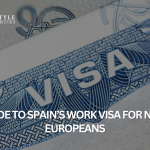The Non-Lucrative Visa in Spain: A Comprehensive Guide for Non-Europeans
If you’re considering a move to Spain and don’t plan to work, the Non-Lucrative Visa is a popular option for many non-European residents, especially retirees or those with sufficient savings. This visa allows non-Europeans to reside in Spain without engaging in any work or professional activities and is renewable annually.
In this guide, we’ll walk you through the eligibility requirements, application process, common challenges, and unique tips for different countries. This is a detailed, step-by-step resource to help you navigate the process with confidence.
What is the Non-Lucrative Visa?
The Non-Lucrative Visa is intended for non-European Union (EU) citizens who wish to live in Spain without working or conducting business activities. It’s ideal for retirees, financially independent individuals, and those who want to experience life in Spain without the pressure of earning income. The visa is valid for one year initially, and it can be renewed for additional periods (typically for two-year extensions after the first renewal).
Key Benefits of the Non-Lucrative Visa
- Renewable: After the first year, you can renew this visa every two years, leading to possible long-term residency.
- Pathway to Residency: After five years, you may be eligible for long-term residency and, after ten years, for Spanish citizenship if you meet the conditions.
- Family Inclusion: Your spouse and dependents (children under 18) can be included in your visa application if they meet the requirements.
Eligibility Requirements
1. Valid Passport
Your passport must be valid for the full duration of your planned stay in Spain. Generally, it’s recommended to have at least one year of validity remaining when applying.
2. Proof of Financial Means
Spain requires proof of financial stability to ensure you can support yourself without working. The minimum monthly income requirement is generally around €2,200 for the main applicant and additional funds for each dependent. This amount is adjusted annually.
- Documents Accepted: Bank statements, pension receipts, investment statements, and other income-related proofs.
- Minimum Monthly Income Requirement (2024): Approximately €2,400 for the main applicant, with an additional €600 for each dependent.
Note: You may need to provide documents from the past three to six months, showing a stable and sufficient financial situation.
3. Private Health Insurance
You must have private health insurance with a Spanish provider or a policy that covers all risks in Spain, as non-EU citizens cannot rely on Spain’s public healthcare system under this visa. Make sure your policy:
- Covers all potential medical needs in Spain.
- Is provided by a company authorized to operate in Spain.
4. Clean Criminal Record
You must submit a police clearance certificate from your home country and any other country where you have resided for the past five years. It’s essential that your record is clean of any significant criminal activities.
5. Medical Certificate
A certified doctor must confirm that you do not have any infectious diseases or conditions that could endanger public health, such as COVID-19, TB, or other communicable diseases.
Tip: Most consulates require a specific format and language (usually Spanish) for the medical certificate. Check with your Spanish consulate to ensure your documentation meets their standards.
Application Process
1. Gather Documentation
Begin by collecting all necessary documents, which may vary slightly depending on your country. Generally, you’ll need:
- Completed visa application forms.
- Passport and copies of all pages.
- Proof of financial means (e.g., bank statements).
- Private health insurance certificate.
- Criminal record certificate(s).
- Medical certificate.
- Passport-size photos.
Important: Documents such as the criminal record certificate may need to be apostilled, and all documents should be translated into Spanish by an official translator.
2. Submit Application at the Spanish Consulate
Applications must be submitted in person at the Spanish consulate or embassy in your home country. It’s essential to contact them early, as each consulate might have specific guidelines, such as setting appointments or additional local requirements.
3. Attend an Interview
During your interview, be prepared to answer questions about:
- Why you want to live in Spain.
- How you plan to support yourself financially.
- How you plan to use the visa (traveling, exploring Spain, or specific personal goals).
Pro Tip: Bring copies of your financial statements and health insurance policies, as consulate officers may ask for clarification or additional documentation.
4. Wait for Processing
Processing times can vary but typically take one to three months. Some applicants report faster processing, while others experience delays, particularly in busy consulates.
Country-Specific Processing Times:
- United States: Expect up to 12 weeks, with busy consulates in cities like Los Angeles and Miami.
- Canada: Usually around 6-8 weeks.
- United Kingdom: Processing is often faster but can vary by location.
- Australia and New Zealand: Consulate locations are limited, so early booking is crucial.
Renewal Process and Long-Term Residency
The Non-Lucrative Visa is renewable, allowing you to continue living in Spain without working. After the first year:
- Renewals are typically for two-year periods.
- After five years of continuous residence, you may apply for long-term residency, giving you more rights similar to those of an EU resident.
- After ten years, you may be eligible for citizenship if you meet the specific requirements.
Common Challenges and Tips
- Document Translations: Most consulates require official translations into Spanish. An accredited translator must complete these translations, so plan this in advance.
- Meeting Financial Requirements: Keep in mind that the financial requirements may be higher in high-demand areas or regions with higher living costs. Ensure your income or savings are above the required threshold, and have recent, up-to-date bank statements on hand.
- Health Insurance Specifics: It’s crucial to confirm with your insurer that your policy complies with Spanish requirements. Spain often requires policies without co-pays, so double-check this with your insurance provider.
- Navigating Different Consulate Rules: Requirements vary slightly depending on the country of residence. For example, applicants from Canada may face different documentation requirements than those in the U.S. Always check with your local consulate for the most specific information.
Additional Resources
For more assistance, consider consulting:
- Spain’s Consulate Websites: Each consulate has specific information, forms, and FAQs for your visa application.
- Legal Advisors Specializing in Spanish Immigration: If you feel overwhelmed, a local immigration lawyer or advisor can guide you through the process, including renewals and residency applications.
- Expat Communities: Join forums or local expat groups on platforms like Facebook or Meetup for advice from others who have successfully obtained the Non-Lucrative Visa.
Moving to Spain on a Non-Lucrative Visa can be a rewarding experience, offering you the chance to immerse yourself in Spanish culture, explore its regions, and enjoy a slower pace of life. With careful planning and attention to the details outlined above, you’ll be well on your way to making your dream a reality.



